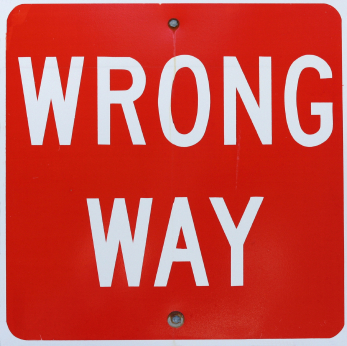The clue train has left the station, and most publishers aren’t on board.

Worst Practices: Betting Against The Net
Ease-of-copying is a feature, not a bug. Learn to harness that feature, and you’ll have a bright future. Try to fight that feature, and you’ll be fighting gravity.
Since the phrase “the Internet” entered popular culture in the early 1990s, I’ve been preaching about the Internet’s many advantages. One of the Internet’s biggest advantage is ease-of-copying. Once piece of content can quickly and easily turn into many pieces of content. This changes everything. Or rather, should change everything. Yet publishers remain mostly clueless about how to leverage the Internet, insisting that the Internet’ biggest asset is a bug.
In November 2006, Google CEO Eric Schmidt coined the phrase “betting against the Internet” when he said (emphasis added):
“What’s surprising is that so many companies are still betting against the net, trying to solve today’s problems with yesterday’s solutions. The past few years have taught us that business models based on controlling consumers or content don’t work. Betting against the net is foolish because you’re betting against human ingenuity…”
Examples Of Betting Against The Net
- The RIAA bets against the Net when it sues its customers rather than providing the content they want at a reasonable price.
- Newspapers bet against the Net when they require users to login to read content.
- The ABA bets against the Net when it requires users to pay to read content.
- Bloggers bet against the Net when they publish partial feeds instead of full feeds.
- Prince bets against the Net when he sues his fans.
Illegal Feeds
When publishers provide partial feeds for their content – or no feeds at all – third parties step in to fix the problem. Gravity. You’re fighting gravity.
For example, I enjoy reading (and legally reprinting) the Dilbert comic strip and Scott Adams’s blog (by Dilbert’s creator). But Dilbert’s publisher, United Media, does not provide a Dilbert feed. Enter Tapestry Comics, which provides feeds for comics, both official and “unauthorized.” The Tapestry Comics Dilbert feed is a full feed. I read it in Google Reader, I share it in Google Reader.
The phrase “illegal feeds” makes a good headline, but it is legally accurate? Is “unauthorized feeds” accurate? Do you need the permission of the copyright owner to read their copyrighted works, or is this fair use? What about sharing an “unauthorized” feed item? Discuss.
Another example. Earlier this year, a certain blog about a popular (freaky?) economics book closed down its standalone blog and moved to a large New York City newspaper website. As part of the transition, the blog moved from a full feed to a partial feed. It’s ironic than an economics blog doesn’t get the economics of blogging. As with the Dilbert blog, an “unauthorized” full feed for the freaky economics book blog quickly popped up. I’ve been reading the unauthorized full feed in Google Reader, and I’ve been sharing it in Google Reader (alongside the inferior partial feed). And why do I not mention the blog by name? Because that blog has a nasty habit of changing stuff for the worse after I blog about them. So they shall now be known as “the freaky economics book blog that shall not be named.”
You can also use FeedYes to get feeds from sites without feeds. And you can use Yahoo search results as a proxy to gets feeds from any site since Yahoo provides feeds for search results. (Google does not. Why, Google, why?)
You can use BugMeNot to bypass newspaper registration pages. BitTorrent to find TV shows. And these are just the examples of betting against the Internet (and the workarounds of those betting on the Internet) that came to mind off the top of my head. There are many more.
Not Everybody Is Clueless
In contrast, Apple bets on the Net when it sells music tracks on iTunes for a reasonable price without copy-protection technology (so-called Digital Rights Management (DRM)).
I bet on the Net when I published my book “The Legal List” simultaneously in print (for a fee) and online (for free) using a Creative-Commons-like print-and-pay copyright notice. This was in 1992, fifteen years ago.
Railroads, electricity, the industrial revolution, television, the Internet. Each revolution has had its opponents. But every technological advance that increases efficiently is a good thing. When efficiency increases, qualify of life improves for everyone. Efficiency is good, inefficiency is bad.
Don’t bet against the Internet. I’d like to see the end of the dark age of the Internet in my lifetime.
Related Posts
- Book Review: Nineteen Eighty-Four
By George Orwell. - Drawing That Explains Copyright Law
Copyright rights, unregulated uses, and fair use. - Death To Partial Feeds
It doesn’t matter where your content is read! - Steal This Article: Epilogue
A technology evangelist’s work is never done. - Microsoft Escalator Attendants
Creating jobs. - Steal This Article: It May Be My Last
Organizations large and small – including the ABA – need to evolve on the ever-changing Internet. - It’s The Metadata, Stupid
For the music that I have purchased, I want all of the metadata: the MP3s, the album art, the BPM data, the liner notes, the lyrics, the tablatures, the recording dates, the release dates, the artist’s history, etc. Today, I can’t get all of the metadata from a single source. - A Smattering Of Things That I’ve Learned In Life
This article explains, in a way that a resume cannot, what life experiences I have had and how these experiences have contributed to the unique perspective that I bring to everything that I do. - The Dark (Gray) Age Of Music On The Internet
While there are a lot of choices for consumers, the current state of music on the Internet leaves a lot to be desired. - Tips On File Sharing From An Unlikely Source – Dell
- Am I A Copyfighter?
One practitioner’s struggles with practicing — while fighting to change — the law in the dark ages of the Internet. - The ‘Duh’ Of Shrinkwrap Licenses
Kids have figured out the problem with shrinkwrap licenses. So why can’t judges? - Business Is A Conversation (Or Clueful Lawyers)
The business of law is a conversation. Are you conversing? - Death On The Internet (Or What Would Orwell Do?)
What happens to a site after its operator is deceased? When a corporate personality dies, should the person’s profile page be deleted from the company site? - Publications: The Legal List
From 1992 to 1995, I published seven editions of my book ‘The Legal List’ in print and on the Internet. This is the complete collection. - Ease-of-Copying In The Digital Age – Turning A Negative Into A Positive
Rather than worrying about ease-of-copying, owners of copyrighted works should use it to their advantage. - Why Lawyers Should Get On The Internet
Legal research on – and legal issues raised by – the Internet.

